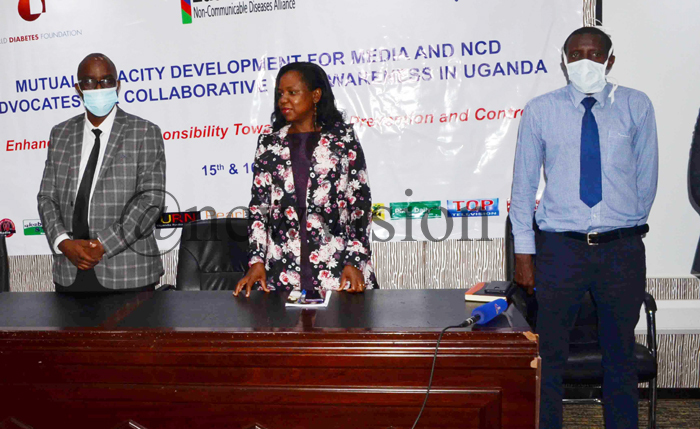Uganda Heart and Cancer Institutes overwhelmed by spike in patient numbers
Dr. Elias Sebatta, a consultant cardiologist says it has become a challenge to introduce social distancing for patients who have come to seek treatment.
Authorities at the Uganda Heart Institute (UHI) express concern that their patients cannot observe COVID-19 social distancing guidelines because they don't have enough space at the Out-Patients Department (OPD).
Dr. Elias Sebatta, a consultant cardiologist at the Institute said it has become a challenge to introduce social distancing for patients who have come to seek treatment. Other patients don't have face masks.
Sebatta said on average, UHI receives about 120 heart patients a day.
"Cardio services have resumed but we have limited space in OPD. Introducing social distancing in such circumstances is difficult. We cannot create an environment where we can easily prevent the transmission of COVID-19. The area where we are operating is still the same size with the same patient number," noted Dr. Ssebata.
This was during the mutual capacity development for media and Non- Communicable Diseases (NCDs) advocates conference organised by Uganda Non- Communicable Disease Alliance (UNCDA) in Kampala on Thursday.
During the lockdown, Dr. John Omagino, the Executive Director of the Uganda Heart Institute, told New Vision that, ferrying supplies, transporting patients and following them up, screening patients for COVID-19 and providing personal protective gear to their staff levied a huge logistical cost on the institute.

"In our approved annual work plan, we expect to see 12,000 outpatients annually including 5,00 cardiac cases, 150 heart surgeries, and over 1000 admissions, but in the first weeks of the lockdown, the numbers of the outpatients, for example, reduced from 100 to about 20 daily," Omagino said recently.
He also said it was difficult on the side of their staff so they had to downsize and also draw up duty a roster, where they would work in shifts depending on their proximity to the facility and access to transport.
Similarly, health workers at the Uganda Cancer Institute have also expressed concern over a spike in the number of patients at the facility.
The head of the comprehensive community cancer program at Uganda Cancer Institute, Dr. Noleb Mugisha said at the height of the lockdown, patient attendance at the facility dropped to about 20 patients compared to the 120 patients they would register before the pandemic. With the easing of the COVID 19 lockdown, the premises are now full and health workers are overwhelmed with the huge numbers of patients who missed their treatment.
"We are trying to juggle and see how the patients catch up," Dr. Mugisha said. He equated missing cancer treatment to not adhering to malaria medication which eventually results in the treatment failing. As such, Mugisha anticipates the mortality rate for cancer patients to increase in the next two years.
The chief officer of the Uganda Non-Communicable Disease Alliance (UNCDA) Christopher Kwizera said due to limitations in transport, many people grappling with NCDs missed treatment. As a result, some patients developed complications and others got disabilities. Kwizera urged the different stakeholders in health care to come in and contribute their role.